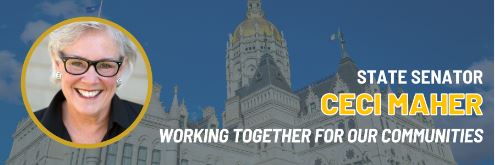FOR IMMEDIATE RELEASE
Wednesday, April 17, 2024
CT SENATE PASSES BILL THAT STRENGTHENS ELECTORAL COLLEGE GUARDRAILS
HARTFORD – The state Senate voted today to have the secretary of the state officially serve as the executive in charge of certifying Connecticut’s presidential electors, thereby taking advantage of a new federal law that updates America’s electoral college regulations for the first time in 135 years in an effort to prevent a recurrence of the January 6, 2021 attack on American democracy.
Today’s bill, Senate Bill 257, designates Connecticut’s secretary of the state as the state official responsible for certifying presidential electors under the federal Electoral Count Reform Act of 2022 (ERCA). As the designated official, the secretary of state must issue the elector certification and then immediately transmit the certificate to the Archivist of the United States.
“There is perhaps nothing more important than modernizing and validating our presidential elections processes, especially in light of the threats that our democracy faced in the 2020 election and its aftermath, ” said Senate President Pro Tem Martin Looney (D-New Haven). “By making this change today, we are taking part in the larger, national discussion of what it means to value and protect our elections and forestall ambiguity that could lead to bad-faith actions.”
“Every state should take advantage of the federal ECRA law and update its statutes now, not only for the sake of clarification, but also to prevent any possibly recurrence of the attempted overthrow of American democracy that we saw in late 2020 and early 2021,” said Senate Majority Leader Bob Duff (D-Norwalk). “If you remember, it was Georgia’s Republican Secretary of State Brad Raffensperger who refused to ‘find’ the 11,780 votes that Donald Trump demanded that he find in order to steal the 2020 election from the American people. Process is important. Integrity is important. People are important. We reaffirmed that today with this bill.”
The Senate bill passed today is a direct result of ECRA, which seeks to provide better guardrails on how presidential election results get from the states to the Electoral College process, and then to Congress, and how Congress handles those ballots once there.
While the new federal law mainly addresses what Congress does after electors are sent forward from the states, it also addresses the states’ side of the equation: the 2022 federal law specifies that the executive of each state sends forward the state’s slate of electors, and that while “the executive” is usually a governor, states can appoint someone else, such as a secretary of state.
The ERCA made a host of other updates and clarifications to America’s electoral college laws, which former President Donald Trump and his Republican Congressional allies attempted to exploit in the weeks leading up to the January 6, 2021 assault on the U.S. Capitol by violent and treasonous Trump supporters who attempted to overturn the certification of Joe Biden as president of the United States of America.










